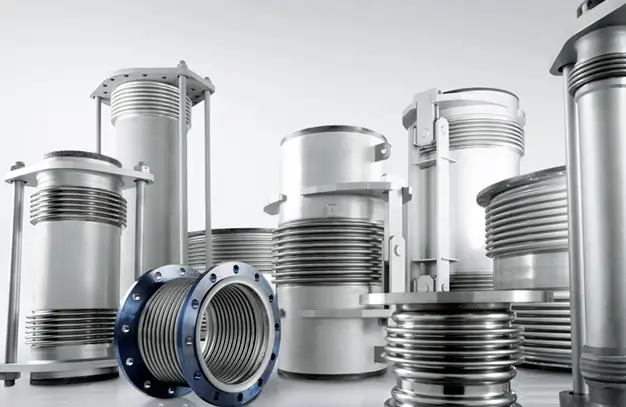Civil/Utilities
Metal Expansion Joint Durable Solutions for Thermal Expansion & Vibration
Metal Expansion Joint: Designed to maintain the integrity of piping systems, metal expansion joints are engineered to absorb thermal expansion, vibrations, and mechanical stresses. Crafted from high-grade materials like stainless steel and carbon steel, they ensure flexibility, durability, and reliability in industrial, mechanical, and structural applications. These joints reduce system stress, prevent damage, and enhance the lifespan of pipelines in industries such as oil and gas, power generation, and construction.
Key Benefits of Metal Expansion Joint
- Stress Reduction: Minimizes stress caused by temperature fluctuations and movement.
- Durability: High-grade materials provide long-lasting performance in extreme conditions.
- Flexibility: Accommodates misalignment, vibrations, and seismic activity.
- Cost Efficiency: Reduces maintenance costs and downtime by preventing system failure.
- Safety: Ensures operational safety by mitigating the risk of leaks and breaks.
Applications of Metal Expansion Joint
- Absorbing thermal expansion in pipelines.
- Compensating for vibration in machinery connections.
- Ensuring proper alignment in mechanical systems.
- Accommodating seismic movements in buildings and bridges.
- Enhancing flexibility in industrial equipment setups.
Key Features of Metal Expansion Joint
- Material Strength: Made from robust metals like stainless steel or carbon steel.
- Customizable Design: Available in various sizes and configurations to suit specific applications.
- High Performance: Withstands high-pressure and temperature environments.
- Ease of Installation: Designed for seamless integration into existing systems.
- Regulatory Compliance: Meets industry standards and specifications.
With Metal Expansion Joints, you ensure durability, flexibility, and safety for your piping and structural systems. Built from high-quality metals like stainless steel and carbon steel, these joints effectively absorb thermal expansion, vibrations, and mechanical stress. Designed for precision and efficiency, each joint accommodates movement and reduces pressure on system components, making your industrial and structural projects more reliable and cost-effective.
FAQ questions for Metal Expansion Joint
An expansion joint is a flexible mechanical device designed to absorb dimensional changes caused by thermal expansion, contraction, vibration, or movement in structures or piping systems.
Metal expansion joints are used to compensate for movement, reduce stress, and enhance the durability of piping systems, bridges, and other industrial applications. They protect the integrity of structures by absorbing vibrations and temperature-induced expansion or contraction.
Key rules for expansion joints include proper sizing, material selection based on environmental factors, adherence to pressure and temperature limits, and ensuring alignment during installation to prevent joint failure.
The primary purpose of an expansion joint is to allow for controlled movement, such as thermal expansion or contraction, and to prevent structural damage in pipelines, buildings, and bridges.
Engineers use expansion joints to:
- Compensate for thermal expansion.
- Reduce vibration and noise.
- Prevent stress-related damage in systems.
- Enhance the lifespan of structures.
Metal expansion joints are used in:
- Industrial piping systems.
- HVAC systems.
- Bridges and tunnels.
- Chemical plants.
- Power plants.
Metal expansion joints come in various types, including:
- Single expansion joints.
- Universal expansion joints.
- Hinged expansion joints.
- Gimbal expansion joints.
- Pressure-balanced expansion joints.
Yes, metal expansion joints can be incorporated into concrete structures to accommodate movement caused by temperature changes or structural loads.
The price of a metal expansion joint varies depending on the material, type, size, and application. For an accurate price estimate, please contact our sales team, who can provide customized pricing based on your project requirements.
Leading manufacturers of metal expansion joints include global brands specializing in industrial components. Nadtex LLC offers high-quality metal expansion joints tailored to diverse industrial needs in the MENA region.
The HS Code for metal expansion joints is typically 7307.21, but it may vary based on specific products.
Yes, metal expansion joints can be used in drywall systems to prevent cracking and accommodate structural movement.
Expansion joints should be used in environments prone to temperature fluctuations, structural vibrations, or where movement accommodation is essential to prevent system failure.
A pipe expansion joint is used to absorb thermal expansion, reduce vibration, and accommodate movement in piping systems, ensuring durability and efficiency.

